Chad Orzel
Chad Orzel, a physicist and blogger, is not afraid to weigh in on the controversial issues of the day. On June 29th, 2010, for example, he made reference to "the immense suckitude of the refereeing" at the then-ongoing World Cup. A few weeks later, he discussed whether the Higgs boson quest deserves the status of "holy grail," and posted a poll with the provocative prompt, "If the Tevatron were to discover the Higgs boson before the LHC does, that would be:" (most popular response at time of writing: "Hilarious. After years of LHC hype, being beaten to the punch would serve them right.")

Chad Orzel
When not blogging, Orzel has a day job as a professor at Union College in Schenectady, New York, where he focuses on quantum optics, which describes what happens when light interacts with very small particles such as atoms. Using lasers, he cools down atoms to a fraction of a degree above absolute zero, and then studies how they interact, which is very different from how they would behave at room temperature.
"As far back as I can remember, I always wanted to be some sort of scientist," Orzel says. "There's a family story about me visiting my grandmother at her work when I was around four and telling people I wanted to be a paleontologist or a marine biologist." Orzel, who grew up in the small town of Whitney Point, New York, became interested in physics in high school, thanks to an inspiring teacher who introduced him to the excitement of physics demonstrations and labs. Orzel went on to Williams College in Massachusetts with the intent of studying physics. Around his junior year, he realized that his professors had a pretty good gig going, and started wondering how he could become a small college professor himself.
The answer, of course, was graduate school, so after graduating from Williams, Orzel went to the University of Maryland in College Park, where he started working on laser cooling with Nobel Prize winner Bill Phillips' research group. After earning his PhD in Chemical Physics, Orzel did a post-doc at Yale, working on Bose-Einstein condensates. He then, in his words, "got lucky," and was offered an assistant professorship at Union College, where he has been ever since. As one of his students remarked recently, Orzel is now "living the dream."
Along the way, Orzel became passionate not only about doing physics research but also about sharing his excitement about science with the public. In fact, Orzel views telling the world about the results of his experiments as one of the primary responsibilities of a scientist. This is a somewhat unconventional view for an academic, as universities tend to reward professors mostly for publishing technical research papers in academic journals.
One of the major ways that Orzel communicates science to the public is through his blog, Uncertain Principles, which he describes as "the miscellaneous ramblings of a physicist at a small liberal arts college. Physics, politics, pop culture, and occasional conversations with his dog." Orzel began blogging in 2002, making him one of the first scientists to adopt the medium. He says he had originally started reading political blogs around the time of the 2000 presidential election, and had considered writing about his own views on politics, but realized he didn't have any particular expertise to contribute.
Orzel's inspiration to write about science came from a blog called In the Pipeline, written by a pharmaceutical researcher named Derek Lowe. Lowe had demonstrated that a blog could be a way for a scientist to communicate directly with the public. Now, of course, there are dozens of physics blogs out there. Orzel tries to make his blog unique by focusing on his chosen field of atomic physics, as opposed to the more blogged-about areas such as string theory and particle physics, and by pitching the science at a very general level. Orzel aims to make his blog readable by high school students.
In an article published in Inside Higher Ed in January 2010, Orzel writes that he initially thought of the blog as "a place to let off a little steam as I went through the tenure process." Now he realizes it's "an essential part of my responsibilities as a scientist." The blog gets around 3,000 readers each day, which allows Orzel to reach a population greater than the entire student body of Union College. He describes his readership as varied: "A lot of science majors and grad students, some science fiction fans, and some people who come for the cute baby and dog pictures. For a while, I was even getting regular links from a blog called ‘Mormon Philosophy and Theology'."
One of the major outcomes of Orzel's blog is his first book, How to Teach Physics to your Dog. The book concept originated from a blog post called "Bunnies Made of Cheese," in which Orzel explains to his dog Emmy why quantum electrodynamics does not predict that bunnies made of cheese will spontaneously appear in the back yard (to her immense disappointment). The popular group blog Boing Boing linked to Orzel's post, which brought him around 50,000 readers. One of these readers was an agent, who wrote Orzel to say he thought that teaching physics to a dog would make a great concept for a book. One thing led to another, and the book was published by Scribner in 2009.
In the book, Orzel uses conversations with his dog Emmy—a dog who can not only speak English, but can also understand quantum physics—as a means to explain quantum mechanics in a narrative, non-mathematical way. Among the concepts that Orzel and Emmy discuss are wave-particle duality, the Heisenberg Uncertainty Principle, quantum tunneling, quantum entanglement, and teleportation. Orzel writes that Emmy "provides a way to keep even very abstract concepts grounded, and to break up dense and potentially intimidating discussions with an element of humor, making the science more approachable."
Another thing Orzel learned is that "you really never understand something until you teach it to your dog. I had to learn a lot about quantum foundations—things they don't really teach you in your quantum courses in college. I also learned a lot about what counts as jargon. My editor was constantly asking me to define terms that we physicists use without even thinking about them. It was a very valuable experience."
When he's not researching, teaching, blogging, or hanging out with his family, Orzel also finds time to serve on the APS Committee on Informing the Public, where he advises APS outreach efforts. And of course, there is a book sequel in the planning stages, in which Emmy will sink her teeth into the nuances of relativity. Stay tuned for that.











